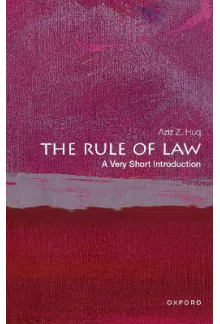- Titulinis
- Dalykinė ir mokslinė literatūra
- Teisės knygos
- Teisė, bendrieji dalykai
- The Rule of Law (A Very Short Introduction)
Aziz Z. Huq
The Rule of Law (A Very Short Introduction)
Balsavo 0
ISBN: 9780197657423
Autorius : Aziz Z. Huq
Leidimo metai: 2024
Leidėjas: Oxford University Press
Puslapių skaičius: 152
Leidinio kalba: Anglų
Formatas: Minkšti viršeliai
Autorius : Aziz Z. Huq
Leidimo metai: 2024
Leidėjas: Oxford University Press
Puslapių skaičius: 152
Leidinio kalba: Anglų
Formatas: Minkšti viršeliai
Pilna kaina:
12.00 €
- % perkant internetu
Kaina:
Šių parametrų produkto neturime
Likutis pakankamas
Pristatymas Lietuvoje per 3-5 savaitės. Galimas vėlavimas
Turime sandėlyje. Pristatymas Lietuvoje 1-4 d.d.
Pristatymas Lietuvoje per 3-5 savaitės. Galimas vėlavimas
Pristatymo sąlygos
Aprašymas
"This very short introduction sets out the origins and development of an English-language debate centered around the phrase "rule of law." It aims is to explore the distinctive ethical contribution offered by various thinkers to this specific phrase, first theorized by the English scholar A.V. Dicey, while largely setting aside how the same questions are framed and resolved in other traditions. The book opens by canvassing the classical and early modern sources upon which Dicey and his successors explicitly drew. It then explores the idea of Dicey, who it flags as the first self-conscious theorist of the rule of law. It then recounts his immediate successors. These include a heterogenous range of thinkers, such as Friedrich Hayek, Lon Fuller, Ronald Dworkin, and Tom Bingham. With this genealogy in hand, the book then reflects the important question of why the rule of law (in some version or other) persists-that is, why do actors with the power to cast aside the rule of law not do so? The book next turns to the ways in which the term "rule of law" has diffused across borders, making it a geopolitical phenomenon. Specifically, the phrase was taken toward the end of the twentieth century across borders by actors as diverse as the World Bank, Singapore, and the Chinese Communist Party. Finally, the book closes by examining the way that the rule-of-law tradition can be challenged both as a matter of theory and practice"--Politicians, judges, and citizens commonly use the phrase "rule of law" to describe some good that flows from a legal system. But what precisely is that good? Even in Aristotle's time, there was no agreement on either its nature, and on whether it counted as an unqualified good. Even now, a core rule-of-law aspiration is that law can constrain how power is flexed. But how or when? Disagreement persists as to whether the rule of law is a matter of how law is used or why it is deployed. In consequence, the World Bank, the leaders of Singapore's one-party state, and the Communist Party in China can all offer their own spins on the concept.
By charting these disagreements and showing the overlap and the conflicts between different understandings of the concept, Aziz Z. Huq shows how the rule of law can still be used as an important tool for framing and evaluating the goals and functions of a legal system. He traces the idea's historical origins from ancient Greece to the constitutional theorist Albert Venn Dicey to the economist and political philosopher Friedrich Hayek. And he explores how that value is coming under pressure from terrorist threats, macroeconomic crisis, pandemics, autocratic populism, and climate change.
By charting disagreements about the rule of law and showing the overlap and the conflicts between its different understandings, Aziz Z. Huq shows how that concept can be used as an important tool for framing and evaluating the goals and functions of law. He examines the historical origins of the rule of law--from ancient Greece to the constitutional theorist Albert Venn Dicey to the economist and political philosopher Friedrich Hayek-and shows how that value is coming under pressure from destabilizing terrorism, macroeconomic crisis, pandemics, autocratic populism, and climate change.
Atsiliepimai (0)
Palikite atsiliepimą

